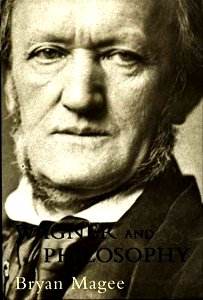Wagner and Philosophy By Bryan
Magee.
Allan Lane £20.00 pp
398.
AmazonUK
£7.19

Most composers had few if any intellectual interests outside music; a great
exception was Richard Wagner who in his younger days was passionately involved
in politics and had a life long obsession with philosophy. He wrote books
on philosophy and no doubt could have made an academic career if he had not
been a composer. This book describes the influence of philosophy on his life
and on the operas.
As a young man Wagner was very influenced by the thoughts of Hegel who postulated
that reality is in a constant state of change. This was expanded by Feuerbach
by rejecting religion and setting materialism on the throne. Soon Wagner
was attracted to the idea of change by revolution rather than by evolution
and he was further influenced by the anarchist Bakunin and then became active
in the socialist/anarchist movement. He was involved in the 1849 uprising
in Dresden; when this failed, he eluded arrest and with Liszt's help managed
to escape to safety in Switzerland.
The author describes how these ideas influenced Karl Marx and led to modern
communism; this is a fascinating part of the book. However, by the time Marx
wrote Das Kapital, Wagner had lost interest in socialism and there is no
evidence that he ever read it.
The Hegelian ideas of change were integral to the ideas behind Wagner's libretto
for the Ring which he started to write in 1844. Wagner also decided that
the form of opera should change so that instead of consisting of a series
of individual pieces such as arias, chorus etc., and spectacular scenic effects,
the music should follow the words (poetry) of the drama in continuous manner.
This leads to a format where the words were predominant and the music almost
secondary. This was put into effect in Das Rheingold but by the time that
Wagner was writing the music for the other operas in the Ring, he had changed
his philosophical allegiance.
Wagner discovered the writings of Schopenhauer in 1854 when the libretto
for the Ring was complete and he was composing Die Walküre. Magee sees
this as the most important intellectual event in the composer's life and
there is no doubt that Wagner was obsessed by Schopenhauer's writings for
the rest of his life.
Kant had described two kinds of reality, the 'phenomenal' which we can experience
(see, hear, measure etc) and the possibility of a part, the 'noumenal', we
cannot experience and whose form or properties which we cannot even conceive.
Schopenhauer took this a step further and described the phenomenon and the
noumenal as two different aspects of the same thing.
This complex set of ideas led Wagner to a Schopenhauerian attitude of resignation
and pessimism to replace his utopian optimism about the effect of change.
It was too late to amend the libretto of the Ring but Tristan, Mastersingers
and Parsifal were deeply influenced by his reading of Schopenhauer.
Another important influence of Schopenhauer was that the latter considered
music to be the most important art form because of its metaphysical properties.
Magee sees this as the reason for Wagner moving away from the pre-eminence
of words in his operas to a much greater emphasis of the orchestra and to
a more symphonic structure as demonstrated in his later operas.
Magee is obviously an enthusiast about the work of his two idols Wagner and
Schopenhauer and with a relaxed style makes complex arguments accessible
and recounts his story in a telling manner. His last chapter is about the
almost paternal role adopted by Wagner to the famous philosopher Nietzsche
and contains some startling medico-sexual information relating to the latter's
illness prior to his insanity.
In many ways, Wagner was a nasty piece of work and an Appendix deals with
his obsessive anti-Semitism. It discusses some of the reasons for this aspect
of Wagner's thoughts and also has an objective look at the relationship between
Hitler and Wagner's music and the absence of anti-Semitism in the operas
themselves. I found the entire book thought-provoking and interesting.
Reviewer,
Arthur Baker
This Review first appeared in the Bulletin of the Federation of Recorded
Music Societies

